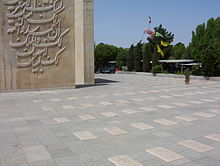Behesht-e Zahra
 |
|
| Shown within Tehran | |
| Details | |
|---|---|
| Established | 1970 |
| Location | Tehran |
| Country | Iran |
| Coordinates | 35°32′10″N 51°22′12″E / 35.536°N 51.370°E |
| Type | Public |
| Size | 534 hectares (1,320 acres) |
| Number of graves | 1,300,000 |
| Website | www |
| Find a Grave | Behesht-e Zahra بهشت زهرا |
Behesht-e Zahra (Persian: بهشت زهرا,The Paradise of Zahara), is the largest cemetery in Iran. Located in the southern part of metropolitan Tehran, it is connected to the city by metro line No. 1. The cemetery has been one of the inspirations for the popular webcomic, Zahra's Paradise.
In the early 1950s, all the cemeteries in Tehran were supposed to be replaced by several large new ones outside the then precincts of the capital. Behesht-e Zahra was built in late 1960s on the southern side of Teheran towards the direction of the city of Qom and opened in 1970. The first person buried in Behesht-e Zahra was Mohammad-Taghi Khial.
Many of the deceased soldiers of the Iran–Iraq War were buried in the martyr's section of the graveyard.
In addition to tombs of the royals, politicians, and other significant people, in the graveyard there are symbolic tombs for the perpetrators of the 1983 Hezbollah attacks on the U.S. Marine and French peacekeepers' barracks in Beirut and for the assassin of Anwar Sadat, Khalid Islambouli. Similarly, a symbolic tomb was erected in the cemetery for Hezbollah member Imad Mughniyah, who was killed on 12 February 2008 in Damascus, Syria.
Tomb of Ruhollah Khomeini
Tombs of Mostafa Chamran and Javad Fakoori
Tomb of Esmat Dowlatshahi
Tomb of Mohammad Sa'ed
...
Wikipedia

